Big Red Book
Celebrating television's This Is Your Life
G H ELLIOTT (1882-1962)
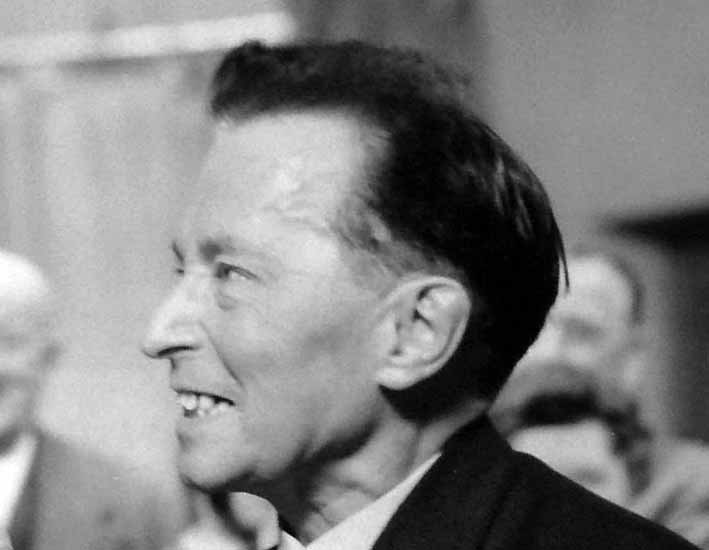
THIS IS YOUR LIFE – George Henry Elliott, singer and dancer, was surprised by Eamonn Andrews at the King's Theatre, Hammersmith, while watching a 14-year-old Richard O'Sullivan imitate his act on stage, having been led to believe he was there to discuss an appearance in a different programme.
George, who was born into a theatrical family in Rochdale, spent his formative years in the United States, where he played juvenile roles on stage and later joined a minstrel show. Returning to England in 1901, he developed a song and dance act which he performed in music halls across the country.
In a career which spanned over 60 years and saw him rise to the top of the bill, he made two Royal Variety Performance appearances in 1925 and 1948 and released over 100 records, including recordings of the songs he was most associated with, such as Idaho, I Used to Sigh for the Silvery Moon and Sue, Sue, Sue.
programme details...
- Edition No: 33
- Subject No: 33
- Broadcast live: Mon 13 May 1957
- Broadcast time: 7.30-8.00pm
- Venue: King's Theatre, Hammersmith
- Series: 2
- Edition: 18
on the guest list...
- Georges Etienne
- Arthur Richmond
- Bransby Williams
- Finlay Currie
- Joe Mott
- Reg Vickers
- Len Barry
- Pat Kirkwood
- June - wife
- Dot Hardy
- Will Rayes
- Hetty King
- Randolph Sutton
- Billy Danvers
related appearances...
- Ted Ray - Oct 1955
- Bransby Williams - Dec 1958
production team...
- Researchers: Peter Moore, Nigel Ward
- Writer: Gale Pedrick
- Director: unknown
- Producer: T Leslie Jackson
- names above in bold indicate subjects of This Is Your Life
- with thanks to Chris Webster and Michael Parker for their contributions to this page
there's no business like it
Stories behind This Is Your Life
a review of the second series
the programme's icon
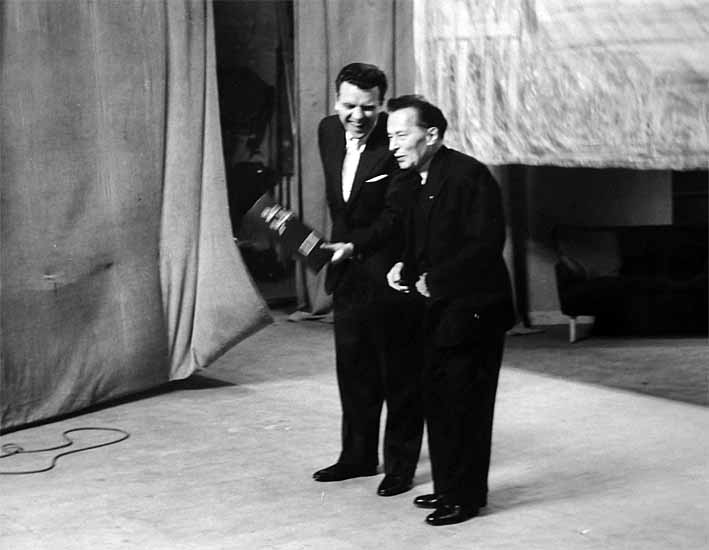
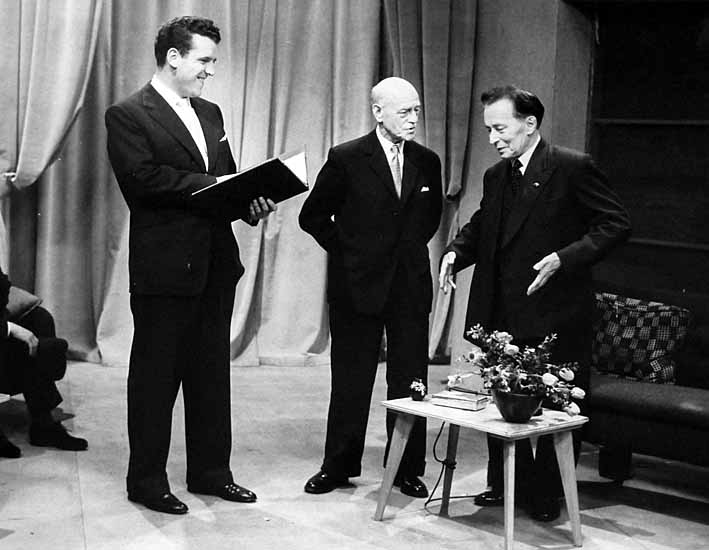
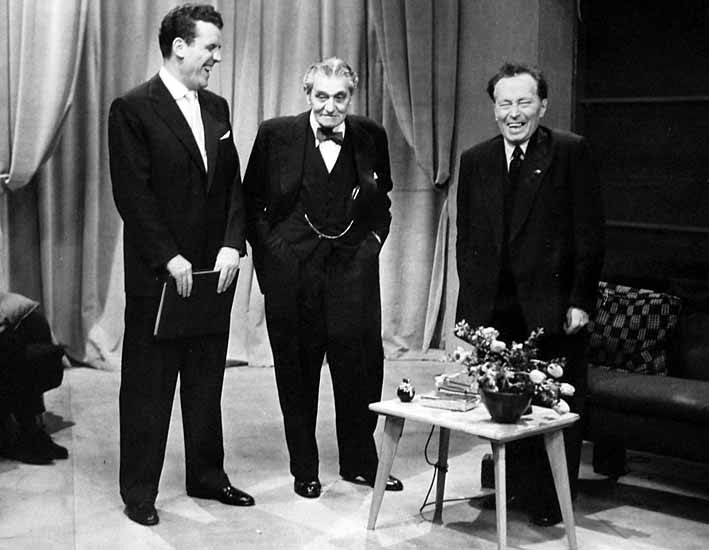
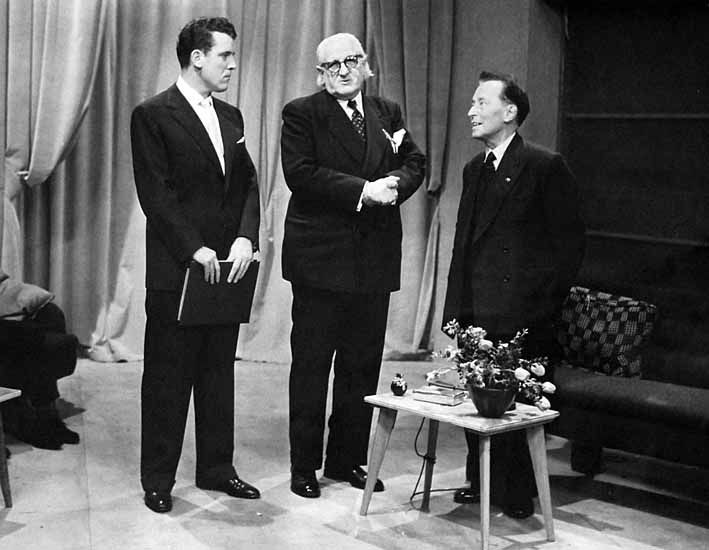
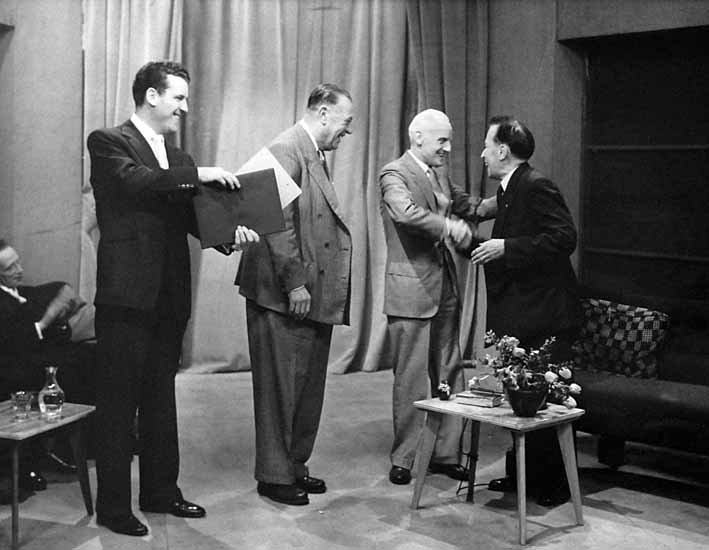
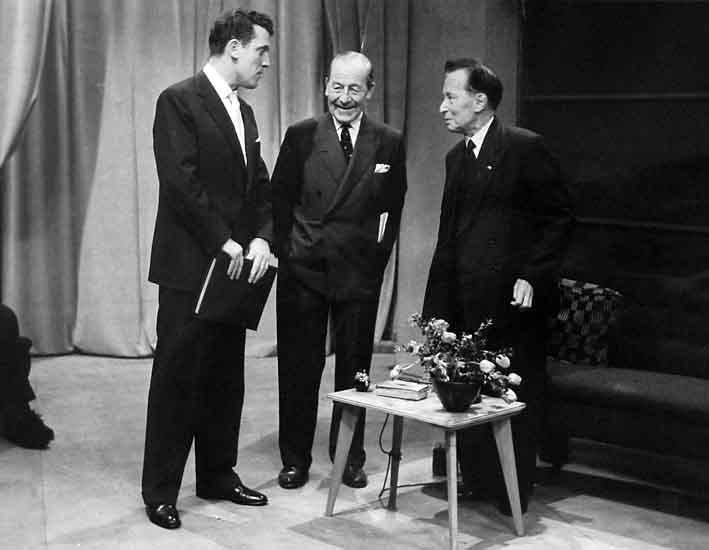
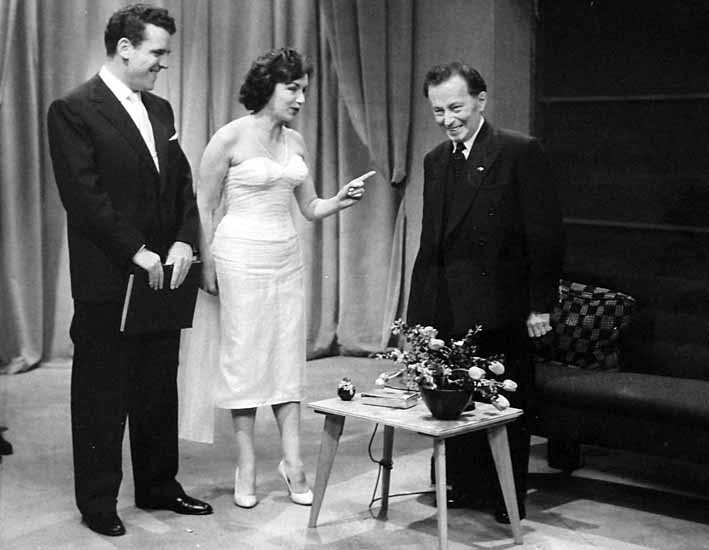
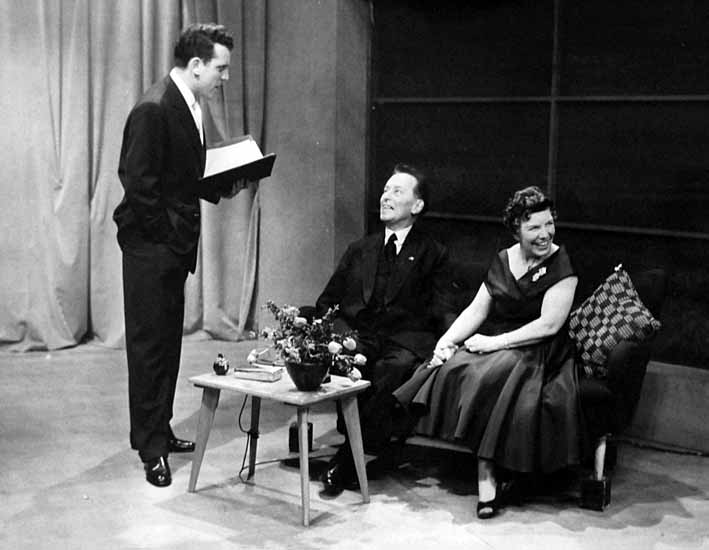
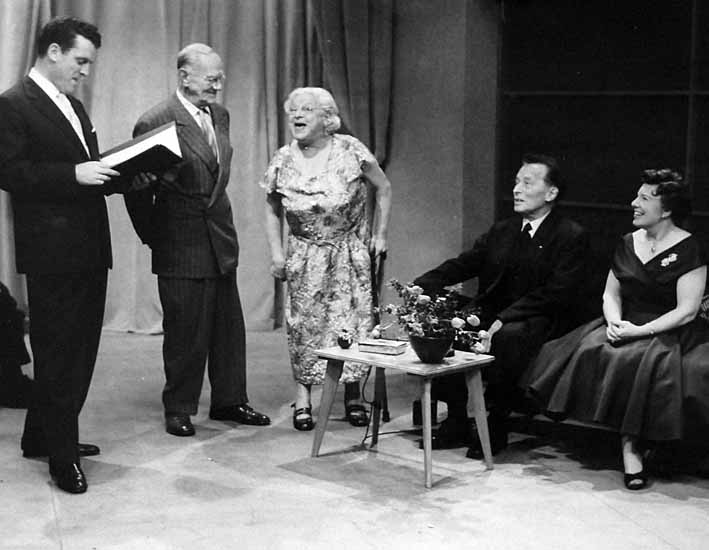
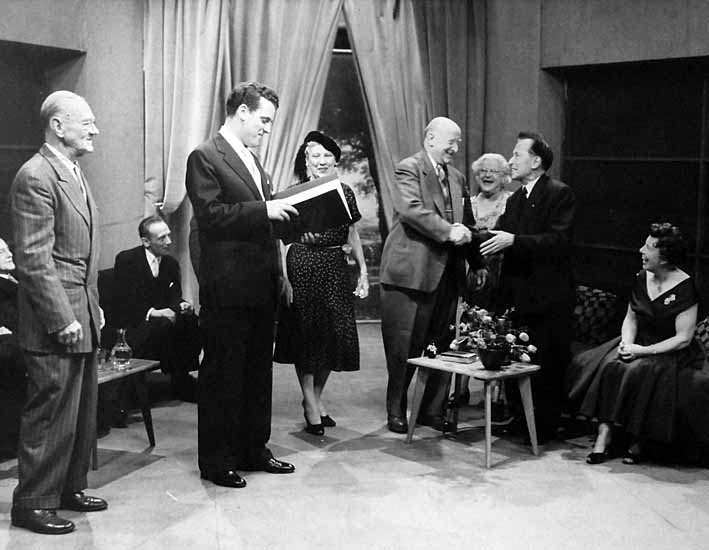
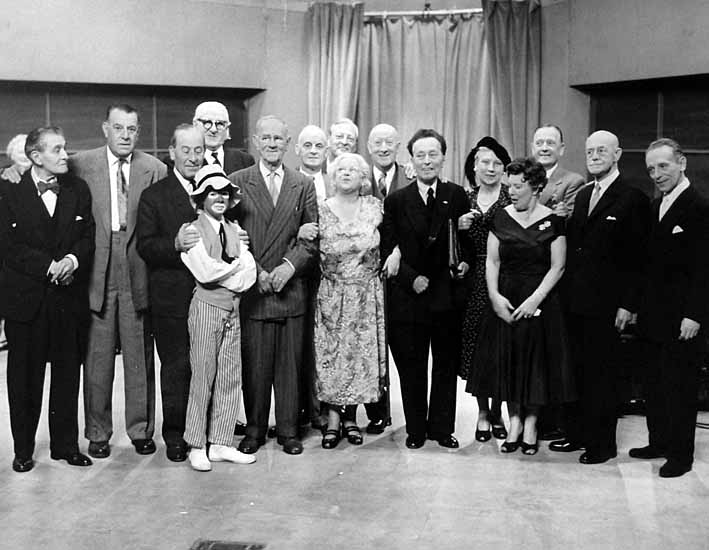
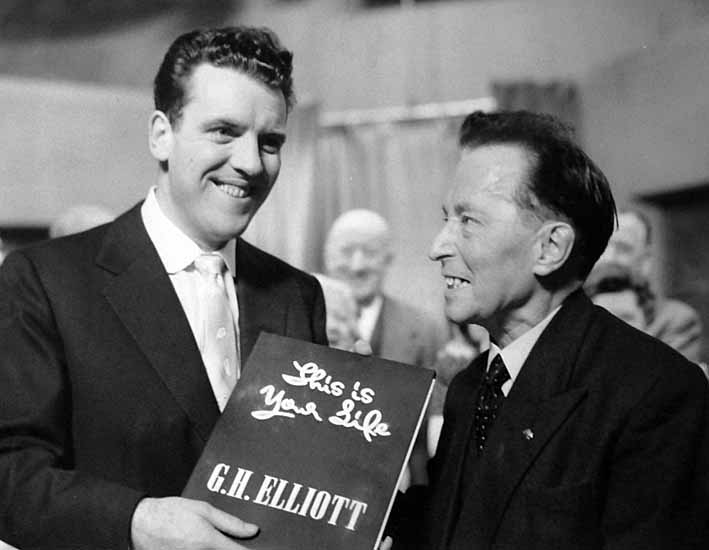
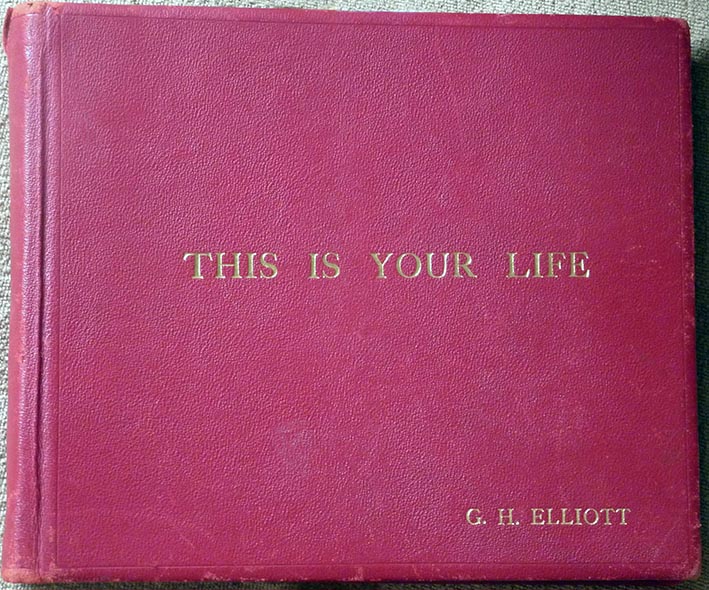
Photographs of G H Elliott This Is Your Life - and a photograph of G H Elliott's big red book
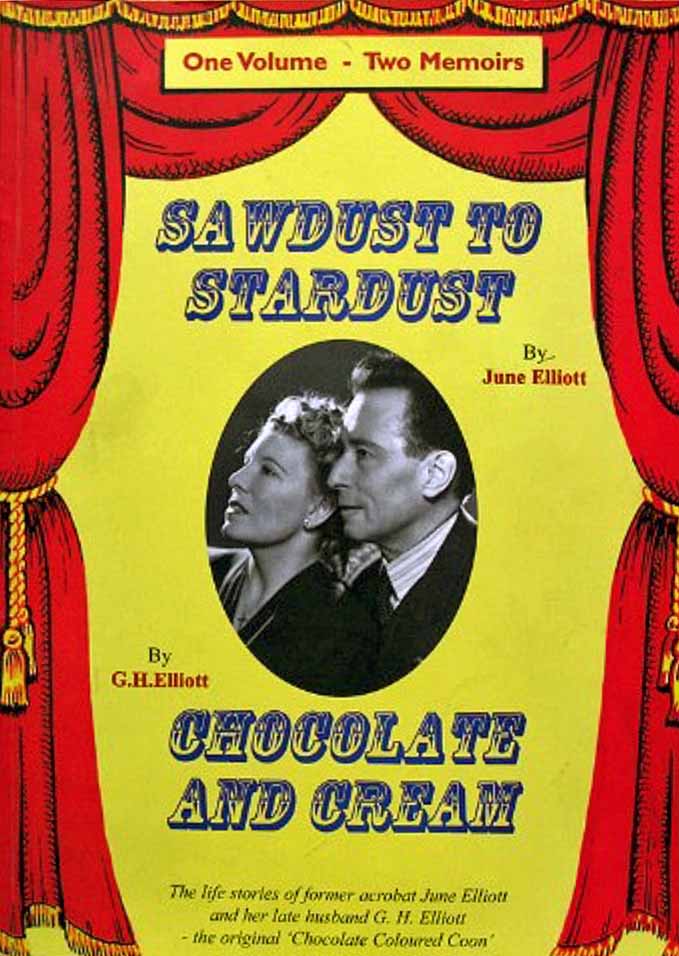
Another memorable experience which came to me in the autumn of my life, was on the evening of May 13th, 1957 when the BBC made me the subject of the TV show, This Is Your Life. I have already covered the programme in detail, but I mention it here for two reasons. Firstly, because the BBC authorities decided that, because (or so they were kind enough to say), my music-hall turn had always been so joyous – this programme was to be one of gaiety and laughter. So nothing of what has been sad in my private life appeared in the TV version – whereas, in this book, now that those concerned have long passed on and cannot be hurt, I shall lift the curtain on much that has never been told before. Secondly, because of all the comedy that went on, to keep from me the fact that my life was to be done on TV, until I actually confronted Eamonn Andrews on the stage of the King's Theatre, Hammersmith, in front of the audience in the TV theatre.
The BBC got through to me and asked me if I would make a brief appearance in the programme Panorama on the night of May 13th, and have a discussion with Eric Robinson, on the difference between old songs and modern 'Pops'. Eric Robinson, the BBC intimated, would praise the new – I could prepare for myself a brief script defending the old. A car would be sent to collect me from my house at Wembley Park, and this would ensure that I was at the King's Theatre in good time for the TV programme.
This is how they got me to the theatre. Panorama was the show I expected to appear in. I had no thought that I was to feature in This is Your Life.
Three weeks before hand, the BBC executive who gathers all the details for This is Your Life, came down to the Grand Theatre, Southampton, where I was appearing in Thanks for the Memory with my wife June, to see her. Of course this had to be kept from me. So he was concealed in Randolph Sutton's dressing room, where, throughout the evening, June kept going, to discuss matters with him, and give him details of people to contact.
I could not understand why June kept going out of our dressing-room. Eventually my enquiries became so pressing that it was decided that the BBC representative should leave the theatre, and that June would see him alone the following day. The next morning she slipped out of our hotel and met him in the park in front of this building. In case, looking out of the window, I should see my wife apparently going off with a young man she had just met in the park, I was told afterwards that the two of them slipped off as stealthily as though they really were engaged on some clandestine project.
When they were away from the front of the hotel, June said, "George never goes to the theatre in the morning. We can safely go there and talk".
For some reason, quite different from my usual habit, that morning, since June was out, I decided to go to the theatre. She was in conference there, with the BBC man, when Hetty King interrupted them to announce, "George is approaching the stage-door". So they had to disappear from backstage hurriedly, and go through the pass-door to the front of the house and into the manager's office.
On the Sunday before the TV programme we were in Portsmouth. June was wanted for a day-long Sunday rehearsal, which had to be kept from me. So, on the Saturday, at Portsmouth, June told me that she wanted to get home early on the Sunday, so "Would I pack on the Saturday? Then we can be away early on Sunday morning". I flatly refused. "From Sunday you will be home for several weeks", I said, "So what's the hurry? I never like getting up early or rushing on a Sunday morning".
So June had to take the Portsmouth landlady into her confidence, and the two of them put all the clocks in the house forward an hour. Also June put the clock in the car similarly on. Thus we got away from Portsmouth early on the Sunday. We had hardly started when I saw a public clock and said, "Look at the time. What on earth have we started so early for?" To which June replied, "That clock must be wrong. Look at the time by the car clock".
When we arrived at home June still had to get away to the Sunday rehearsal without my knowing what was afoot. So she arranged with the woman helper who had come to cook lunch and have it ready for us when we got in, to announce that she must leave immediately, "as her mother was not well". June said, "Well stay and have lunch and wash-up, then I'll drive you to your mother's. If I do that, you'll be there earlier than if you go now and travel by train". Thus she got away without my having any suspicion of what she was going to do.
On the Monday, June was also required for a day-long rehearsal and run through. So again there was a plot and scheme. A neighbour called and said she was going to spend the day going round the West End shops. Immediately June said, "I'll come with you." "What about my appearance on 'Panorama' tonight?" I asked. "Oh, I'll watch it on TV", June replied. "The BBC are sending a car for you, which will also bring you home, so you don't need me to drive you. Just be ready when the car calls for you; none of your last minute rushes. And get your hair cut during the day. You're on vision tonight remember, not sound radio".
That night the car duly called for me. Apparently when we got near Olympia, it looked as though we were going to arrive at the King's Theatre too soon. The driver said, "I'm terribly sorry, Mr Elliott, but I've got to make a most important phone call. Would you mind waiting in the car whilst I do so?" Then he disappeared, leaving me seated in the car. He was away quite a long time, and I was starting to get agitated, when he returned, apologised for keeping me waiting, and we continued the journey.
As we pulled up outside the front of the King's Theatre, Hammersmith, Eric Robinson came down the front steps, opened the car door and said, "Good evening George. We've time to spare, come with me to the lounge and we'll just have a run through what we're going to say tonight". We had hardly started on this, when a man came in and said, "Oh, Mr Elliott, in another programme there's a fourteen-year old boy giving an impersonation of you. Would you like to come and watch him do it?" Eric Robinson said, "Oh yes, we've plenty of time. Come on George". He took me down to the stalls, and on the stage, a small boy was giving an impression of me singing, I used to sigh for the silv'ry moon, in front of the packed audience in the theatre.
As the boy finished, Eric Robinson said, "Go up on the stage, George, and congratulate him". I was just saying that really I could not do that, when he gave me a push, and before I quite realised what had happened, I was on the stage speaking to the small boy – fourteen year old Richard O'Sullivan.
As I finished my remarks to him, a compere came on stage and said, "Before you go, Mr Elliott, there's someone here who is most anxious to meet you." I turned round to see who this was, and Eamonn Andrews stepped on stage and said, "Yes, Mr G H Elliott, I'm very happy to meet you because, this is your life." I exclaimed, "Oh, good heavens", and sat down suddenly on a settee, with a look of astonishment on my face – and the programme was away.
When I was the subject of the TV programme This is Your Life, done on May 13th 1857, from the King's Theatre, Hammersmith – the first person the BBC produced to surprise me was Georges Etienne from Brussels. He was the son of the managing director of the Scala Theatre, Brussels. In the 1914 war, when I was over in France and Belgium entertaining the troops, I appeared at this theatre. Georges was then a fourteen year old boy, and he was so taken with my songs and dances that he started to do impressions of me. In 1919, we both appeared on the same programme at the Scala Theatre.
In 1940, when the Germans invaded Belgium, Georges escaped to England, and in 1942 found himself in London in British Army uniform. I was the only person he knew in Great Britain, and he traced me to Glasgow where I was playing, and we had a very happy reunion.
Following on Georges Etienne the BBC came to hand with Arthur Richmond. Arthur's parents, like mine, had emigrated to America from the North of England, and we were boyhood friends in Newark, New Jersey. They returned to England before my mother, father and I, and we met again in Leeds. When I did go to school at all, it was to Harehill's Board School, Roundhay Road, where Arthur was a pupil. We once put on a show together in the hay loft of Arthur's house, charging the other kids of the neighbourhood a penny admission, and we raised enough money so doing, to buy ourselves football boots. Arthur's father got me an engagement singing in a pub in Birmingham, where I was a great success singing My pretty Zulu Loo, wearing a black satin frock coat with gold revers, an old gold top hat, gold turn-ups to the trousers and flashing paste diamond rings and tie-pin.
Bransby Williams also came into the TV programme, and recalled an occasion many years previously, when we shared top of the bill at Shepherd's Bush Empire. I was down to follow him in the second half of the programme, and ahead of me, as a change from his Dickens character studies, Bransby, who is a brilliant mimic was giving impressions of music-hall stars of the period. After he had done several, he asked the audience who they would like him to portray, and a stentorian voice shouted, "Give us GH Elliott". Finlay Currie the film actor was brought by the BBC into the programme of my 'Life', and recalled the days when he was pianist to his wife in the act of Maude Courtney and Mr C, whom I had on my variety bills, and with whom I entertained the troops in the 1914 war. Joe Mott and Reg Vickers were two other artistes from the RNAS first world war concert party the BBC were able to trace and bring into the programme, and only serious illness of his wife prevented Gus McNaughton, the farce and film comedian who was also in the show, from coming along to the TV studio. Len Barry, the well-known agent and I first met in France in 1915. From 1921 he has handled my business. The BBC got him along to Hammersmith, and Len must be one of the very few, if not the only agent who has ever made a personal appearance on a TV programme.
Pat Kirkwood came along and recalled how, when she was fifteen years old, Gertie Gitana and I booked her for a show we were running. The same revue gave Ted Ray his first opportunity and good billing on the posters.
It would seem that no expense is spared by the BBC in bringing people together for This Is Your Life TV programme, for on mine, the Corporation flew from California, where they are now living, Dot Hardy and her husband Will Raye. When I was a boy singer travelling with my mother in 1894, Dot, travelling with her mother, was doing an act with her sister. We were both on the Variety programme at Portsmouth, and I was first turn. Dot's mother protested to the management about my being given such a difficult spot; with the result that her daughters were moved into that position, and I was moved into theirs. Recalling it, Dot Hardy said her mother remarked, "It's my own fault. That will teach me to keep my mouth shut".
Will Raye told how, many years ago in America, the train on which we were travelling was held up by bandits and the passengers robbed. Not an unusual occurrence then in the wild and woolly west, but we did not lose anything because the bandits never touched women and children, and my mother was carrying the money.
The last artistes on the TV programme were Randolph Sutton, the light comedian, the original singer of On Mother Kelly's Doorstep, Hetty King, the male impersonator, the original singer of All the nice girls love a sailor, and Billy Danvers, the cheery chubby comedian.
Ran and Billy toured with me in the original production of Thanks for the Memory.
Series 2 subjects
Peter Scott | Ada Reeve | Peter Methven | Sue Ryder | Harry S Pepper | Compton Mackenzie | Maud Fairman | Billy SmartBrian Hession | John Barbirolli | Duncan Guthrie | Esmond Knight | Sammy McCarthy | Edwin Madron | Diana Dors
Parry Jones | Percy Flood | G H Elliott | Stuart Hibberd